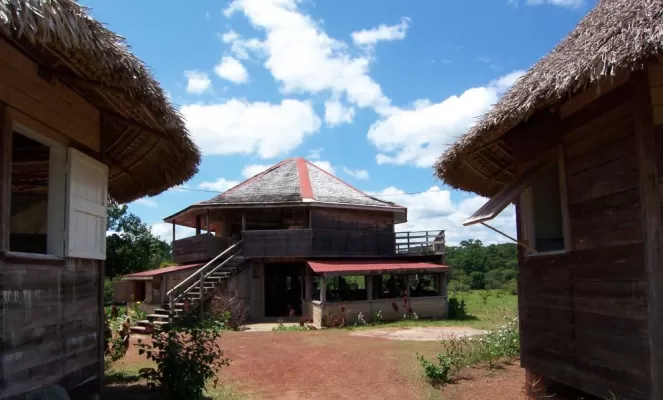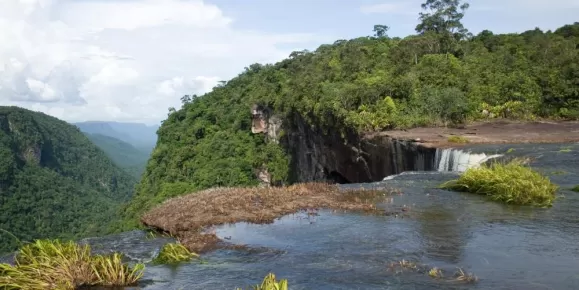The Eco Lodge at Surama is the visitor's gateway to the idyllic Pakaraima Mountains and Burro Burro River bordering the village. This part of Guyana features some of the most impressive examples of thriving rainforest ecology to be found anywhere on earth. The abundant flora and fauna is masterfully curated by local residents who convey a compellingly intimate fluency with nature through hikes, river canoe expeditions, and visits to community schools, centers, and traditional events.
The Eco Lodge—plus tours in and around Surama—are managed and operated solely by the Makushi. More than 70 people are employed either directly as hospitality staff, guides, cooks, artisans and drivers or indirectly as farmers, hunters, fishermen, and construction and maintenance workers. Roughly 60% of the community's income is now sustainably generated through tourism-related activities. Apart from direct employment from eco-tourism, the community also benefits from economic activity derived from products and services that support Surama's tourism micro-industry, with profits feeding village investments in non-tourism and microlending projects. Meaningful opportunities for employment at home have significantly reduced incentives for men to abandon their homes to mine or cut timber in other parts of Guyana. This is a sparsely-populated country (larger than Idaho but with fewer people than the city of San Francisco) so economic opportunities are, indeed, rare. Surama demonstrates a conscious effort to preserve an intimate, authentic, and (in every sense of the word) familiar experience for visitors. The Eco Lodge accommodates small groups only, reducing visitors' footprints not only in the wilderness but also in the classrooms, cassava factories, and village homes featured on a memorable visit to Surama.
Surama's residents—especially the children—are personally invested in the preservation of the biological diversity that surrounds the village, leading visitors on hikes to nearby active Harpy Eagle nests, enforcing a ban on wildlife trapping, protecting groves of endangered bullet, letter, greenheart and waramaden trees, and introducing tourists and researchers to vast arrays of rainforest flora with time-honored medicinal properties.
Travelers Tips
The lodge is operated cooperatively by villagers who take time out of their normal daily routines to provide services to guests. You will be treated to authentic Makushi hospitality, as if you were a guest in one of their homes. Lodging is provided in one of four traditional 'benab' buildings or the new cabin-lodge. All have attached bathrooms with running (cold) water and flush toilets. The buildings are simple, comfortable, and clean. Home cooked meals are served in the central benab and tea/coffee service is available around the clock. Local and traditional dishes are regularly served here, and many ingredients are grown in the on-site community garden. Vegetarian menus and other dietary requirements can be met with advance notice. Ask for a chance to sample local specialties such as cassava (in bread or farine form), manioc, casrip, and other locally grown vegetables.
Electricity is solar-powered with a limited number of outlets provided in the central building for recharging cameras and other gear. Communication with the outside world is limited to VHF radio, however a primitive internet connection is sometimes available in the village office, a 40 minute walk from the lodge. This is a place for getting away, not for modern conveniences!
Typical activities based at Surama include Buro Buro river trips, sunrise hikes to the top of Surama Mountain, a village and school visit, and medicinal plant demonstrations in the surrounding forest. Some visitors will come to Surama as part of a day trip from Iwokrama, the Canopy Walkway, or Rock View Lodge, but to really get a feel for the place it's best to spend at least two leisurely days and nights. Surama operates a number of satellite camps outside the main lodge for those wishing to get deeper into nature (and, of course, the farther you travel away from human habitation the more wildlife you encounter). Two of these camps offer thatch roofed structures under which you can hang a hammock: Carahaa Landing on the Buro Buro river is the starting point for many river trips; and Rock Landing several hours upstream. Those looking to go even further afield will head for Caronparo Landing, a corner of the Surama area steeped in history and storied tradition where you have an chance of spotting Guyana's rare poison dart frogs (yellow, orange, green, and copper-colored).
Surama Village and the Eco-Lodge is reached by road, 90 minutes from opposite directions from either Iwokrama or Annai.































